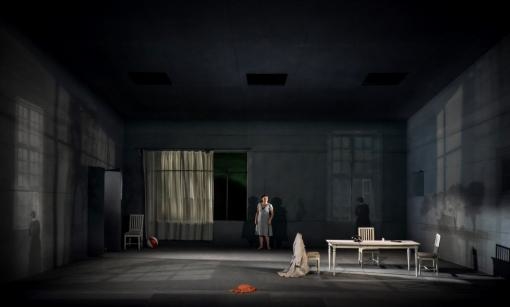The last premiere of the Brno opera season for the first time ever and rather unusually combined two works. The Janáček Theatre presented the surrealist opera Three Fragments of Juliette by Bohuslav Martinů along with the small opera work The Human Voice by Francis Poulenc. The composed evening, with direction and stage design by David Radok, brought together two almost absurd worlds. And this connection was indeed remarkable dramaturgically, visually but also interpretatively.
The seemingly different works of Martinů and Poulenc are, however, linked by more than just their illusory nature, human mind, memories and perhaps unrealness. Director David Radok has virtuously combined the two operas with motifs that truly intermingle throughout the two works. Both stories, or rather dreams and mimosas, were played on the same minimalist clear stage set in some idyllic Paris. The arrangement of a few casually dropped items does not change between the two parts. Radok's visualization of surrealist Juliette hides in itself innumerable little symbolics and gestures. The director does not try to explain anything of that bizarre vision, but to slightly open it instead. Přemysl Janda's light play and Zuzana Ježková's tasteful costumes complete the feeling of a pleasant trance. Everything flows in and out soothed by the wave of a curtain in the window in the perspective of the scene in a dreamlike blue-gray light.
The two operas are minimalist in their characters as well. Next to Juliette, perfectly personified by the sparkling voice and acting lightness of Jana Šrejma Kačírková, stands the role of dazzled Michel. The memories of an elegant and dreaming man were rendered by visiting Magnus Vigilius, whose bright and clear tenor and pleasant expression were truly impressive. The secondary role of the Seller of Memories, Grandfather Young and Night Watchman, were represented by only one singer, for the premiere evening Roman Hoza, who keeps surprising the audiences with his constantly developing voice power.
The transition to the second half of the evening, as already mentioned, is visually barely perceptible. However, Poulenc's instrumentation induces the astringent atmosphere of the expectation of a Woman who is anxiously waiting for the telephone to ring at last, and she hears the voice of her lover who left her for another woman. The Human Voice is actually a one-woman show, which takes place in the gold cut of the stage, fully depending on the length of the telephone cable. Only in the most desperate moment is the Woman literally cornered and that is also her only moment of hysteria. Misery and despair of the Abandoned was portrayed silently by Jana Šrejma Kačírková, feeling guilty of the breakup of their relationship. She releases her inner tears and thoughts of suicide gradually, straining everything more efficiently and up to the point of almost unbearable. Her inner restlessness is escalates by the libretto of Jean Cocteau, which is half silence and half text – it's essential passages are also those in which the Woman receives answers and questions (unheard by the audience) from the man at the other end of the conversation, which we do not really know actually happened.
Jana Šrejma Kačírková, although she was moving around the stage on her own and was relatively limited in space, filled her role completely with uneasy restlessness and changes of affection, yet still surpassed admirably all the demands of the role on her voice, but also on her mental maturity. She retained her modest affection and her sparkling yet pleasantly full voice for the entire length of the tremendously difficult work. She led the tension in it to dynamic peaks in a very conscious and restrained manner, and here we speak of a part that is very demanding, both in terms of expression and text. Her dialogue with the well-prepared orchestra was led by the conductor Marko Ivanović. His conception of the two pieces is fresh and works excellently with singers, with an echo behind the scenes but also in piano passages of the text, rather declaimed than sung.
The last and splendid production of this year's season accompanies the audience somewhere between dream and reality so lyrically that it seems more ideal to stay silent than to talk about it. It clearly proves even the hundreds of times repeated maxim that less is sometimes more. The production avoids great gestures or a great sensation and is left in its own intimacy, making it so much more impressive.
Bohuslav Martinů: Three Fragments of Juliette, after a play by George Neveux
Francis Poulenc: The Human Voice, libretto by Jean Cocteau
Direction and stage design – David Radok
Musical production – Marko Ivanović
Costumes – Zuzana Ježková
Lighting design – Přemysl Janda
Video projection – Dalibor Fencl
Soprano, Juliette – Jana Šrejma Kačírková
Michel – Magnus Vigilius as a guest
Seller of Memories, Grandfather Youth, Night Watchman, Old Arab – Roman Hoza
Grandmother – Eva Novotná as a guest
Grandfather – Josef Škarka as a guest
Young Arab – Lily Velková
Echo – Monika Kaštanová, Eva Daňhelová, Veronika Havasi, Eliška Münsterová, Leona Kyzlinková, Lada Novotná, Veronika Tlachová, Tereza Krejčí
Orchestra of the Janáček Opera, National Theatre Brno
In co-production with GötebourgsOperan
Written after the premiere of 14 June 2019
































No comment added yet..